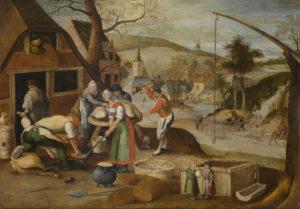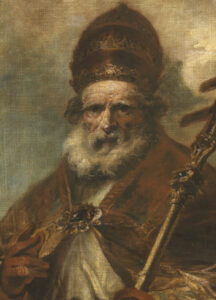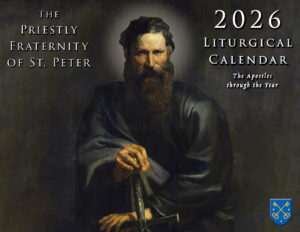The Fast of the Seventh Month
by Rev. Cav. William Rock, FSSP, SMOCSG

One of the most ancient practices of Christianity as practiced in the city of Rome is the keeping of the Ember Days (Latin Quatuor Tempora, “four times”). According to the old Catholic Encyclopedia, “the ‘Liber Pontificalis’ ascribes to Pope Callistus (217-222) a law ordering the fast, but probably it is older. Pope St. Leo the Great (440-461) considers it an Apostolic institution.”1
For those who may be unfamiliar, the Ember Days are four sets of three days (Wednesday, Friday, and Saturday) somewhat evenly spaced throughout the year which are kept as days of penance. In the 1917 Code of Canon Law, the Ember Days were to be kept as days of fasting and abstinence, with no exception for those which corresponded with the Octave of Pentecost (the Ember Days, it should be noted, predate this Octave) (canon 1252.2). By 1962, the abstinence on Ember Wednesdays and Saturdays was reduced to partial. These sets of days, as they correspond, some better than others, with the changes of natural seasons, were observed as a way to give thanks to God for the blessings of the previous season and to ask His blessing on the one beginning. As ordinations at Rome historically occurred on Ember Saturdays, these days were also days of preparation for this event.
With respect to their origin, the Ember Days seem to be a christianization of Roman agricultural celebrations with the December Ember Days being the christianization of the feriæ sementivæ (“for the seeding”), the Summer Ember Days of the feriæ messis (“for a bountiful harvest”), and the Autumn Ember Days of the feriæ vindimiales (“for a rich vintage”).2 The Lenten, or Spring, Ember Days, which seem to be without an agricultural precedent, were added, presumably, to balance out the year. The Autumn and Winter Ember Days are also called the Fast of the Seventh Month and Fast of the Tenth Month, respectively. Lest there be any confusion regarding calling the September Ember Days the Fast of the Seventh, and not the Ninth, Month and the December Ember Days the Fast of the Tenth, and not the Twelfth, Month, it is important to note that the Roman calendar, prior to the reform under Julius Caesar (d. 44 B.C.), originally marked the beginning of the year in the spring with March being the first month,3 thus making September the seventh and December the tenth, hence their names (septem, “seven”; decem, “ten”).4 So while September and December were not the seventh and tenth calendar months at the dawn of Roman Christianity, they were still the seventh and tenth months by name.

Some authors, such as Servant of God Dom Prosper Guéranger,5 attempt to justify the keeping of the Ember Day fasts by invoking the Prophet Zacharias (8:19): “Thus saith the Lord of hosts: The fast of the fourth month, and the fast of the fifth, and the fast of the seventh, and the fast of the tenth shall be to the house of Juda, joy, and gladness, and great solemnities: only love ye truth and peace.” The Fasts of the Seventh Month and of the Tenth Month mentioned by the Prophet, then, would correspond with the September and December Ember Days. The Fast of the Fourth Month would correspond with the Ember Days following the Feast of Pentecost which can fall between May (the third month) 10 and June (the fourth month) 13. If one were to assign a correspondence in the Roman liturgical calendar for the Fast of the Fifth Month, the fasts before the Feast of the Nativity of St. John the Baptist and before the Feast of Sts. Peter and Paul, both celebrated in late June, close to July, the original fifth Roman month, serve as possible candidates. It is not by coincidence, then, such authors would argue, that this passage of the Prophet is read as part of the Fourth Lesson on September’s Ember Saturday (Zach 8:14-19). Rather, it is the Church’s liturgy itself giving witness to the origin of these fasts.
It is clear, however, that there is not a perfect correspondence between the passage from Zacharias and the Roman liturgical calendar. This is most likely due to the Prophet being invoked as a justification for a practice which was already being kept rather than the passage serving as the inspiration of the practice. As was said above, the origin of the Ember Days is more likely a christianization of Roman agricultural celebrations at a very early date rather than the application of the writings of an Old Testament Prophet to the Christian liturgical year, although the Scripture text may have inspired the names of these christianized observances. Dom Guéranger himself notes that “in the early writers” there is mention “of the three times [of fasting] and not the four,”6 but argues this is because the Ember Days of Lent add nothing to the Lenten fast already being observed. Again, it seems more likely that the Spring Ember Days were added later, but by the time of Pope Gelasius (A.D. 492-496), to balance out the calendar.

Starting in August and continuing until the start of Advent, the weekly Sunday and ferial Scriptural Lessons as well as any Patristic Commentaries for the Office of Matins, the Church’s night office, are determined by the week of the month and not by weeks after Pentecost as are the Sunday Gospel lections, their commentaries, and orations. Prior to this, however, even the weekly Sunday and ferial Scriptural Lessons as well as any Patristic Commentaries are also determined by the weeks after Pentecost. In the Breviary, the material for the September Ember Days is presented on the Wednesday, Friday, and Saturday of the Third Week of September as these Ember Days always fall during this third week. On each of these days, a short commentary from a Father of the Church on the Gospel of the day is given. However, at the start of the week, that is, for the Third Sunday of September, prior to the changes made to the Breviary under Pope John XXIII (d. A.D. 1963),7 in place of a commentary on the preceding Scriptural Lessons as is usual, the readings for the second nocturn are taken from Pope St. Leo the Great’s Ninth Sermon on the Fast of the Seventh Month. In this Sermon, the Holy Pontiff touches on keeping the expected fast and the spiritual advantages of giving alms. This all resonates well with the reasons expressed by the old Catholic Encyclopedia for the institution of the Ember Days: “The purpose of their introduction, besides the general one intended by all prayer and fasting, was to thank God for the gifts of nature, to teach men to make use of them in moderation, and to assist the needy.”8 At the conclusion, the Holy Pontiff mentions the station at St. Peter’s, which is still listed as the station in the Missale Romanum, the station being the church in Rome where the Pope himself would say Mass on certain days.

On the Sunday following, the Fourth Sunday of September, the Patristic Commentary for the second nocturn is taken from St. Ambrose’s Book upon Elijah and Fasting. The text chosen is not a strict commentary on the preceding Scriptural Lessons, which are taken from the Book of Judith, but she is referenced. There is also a connection with the Sunday next, on which the Book of Esther is begun, by the mention of her. In the text provided, Ambrose, Bishop of Milan (d. A.D. 397), first details the dangers of drink and drunkenness while extolling sobriety. This is a fitting warning to be read following the September Ember Days which are associated, it is believed, with the Roman vintage festival. The Saint also praises the fruits of fasting by extolling the deeds wrought by God through these two great women which He granted them in light of their fasts, Esther’s even being kept for three days. As the Church has just finished three days of fasting herself, such a reminder of the benefits of fasting is timely.
For the sake of the edification of the faithful as we enter into these Autumn Ember Days and so that they may keep these days with the same spirit which was expected of the early Christians and which the Church perennially expected of her children by including them in her liturgy, I here present translations of these readings just mentioned.9
For the Third Sunday of September from Leo’s Ninth Sermon on the Fast of the Seventh Month:
Well do I know, dearly beloved, that many of you are fervent in your observance of all those practices which belong to the Christian Faith, so that ye have no need to be admonished by our exhortations. For what tradition hath laid down, and custom well established, is neither unknown to the learned nor neglected by the devout. But because it appertaineth to the priestly office to exercise the same general care over all the Church’s children in all such matters as be profitable alike to the learned and to the simple (both of whom are equally dear to us), we do now exhort the both of you to celebrate, with lively faith, and all due discipline of soul and body, the Quarterly Fast, which the seventh month [that is, September] doth once again bring to us in its yearly round.
The Ember Days of fasting are appointed to the four seasons [observántia quátuor est assignáta tempóribus], in order that their quarterly recurrence in the course of the year may teach us how unceasingly we need to be purified, and how, as long as we are tossed about by the changes and chances of this life, we need through fasting and alms-deeds to be cleansed from the stain of that sin which we have contracted by the frailty of our flesh and our concupiscence. Let us diminish a little, beloved, what we are accustomed to use for ourselves, in order that we have somewhat more to use for the relief of the poor and needy.
The conscience of the generous can thus be made glad by the fruits of their own liberality. Whilst thou art giving happiness thou shalt receive joy. Thy love for thy neighbor is a unity with thy love for God; and He hath taught us that in the unity of this twofold charity is to be found the fulfillment of all the Law and the Prophets. Further, if anyone doubt that what is given to man is offered to God, we have the saying of our Lord and Saviour, when He spake of feeding and helping the poor: Inasmuch as ye have done it unto one of the least of these, My brethren, ye have done it unto Me. Wherefore, let us fast on Ember Wednesday and Friday; and on Ember Saturday let us also keep vigil at the shrine of blessed Peter the Apostle; by whose merits and prayers we believe that we shall be aided, so that we may please our merciful God in our fasting and prayer.
For the Fourth Sunday of September from Ambrose’s Book upon Elijah and Fasting (Ch. 9):
It is not for kings to drink wine, nor for princes strong drink, lest they drink and forget the law. Prov. xxxi. 5. The rulers drank wine even unto drunkenness, who planned to deliver themselves into the hand of Holofernes, captain of the host of the King of the Assyrians but the woman Judith drank not, who fasted all the days of her widowhood, saving the solemn Feast-days. She went forth in the harness of this abstinence, and over-reached the whole army of the Assyrians. By the clear thought of her soberness she took away the head of Holofernes, kept her chastity, and carried off the victory.
Armed with fasting, she entered the camp of the strangers. He lay soaked in wine, so that he could not feel the blow that slew him. And thus, the fast of one woman overthrew the countless armies of the Assyrians. Esther also became fairer by fasting for the Lord gave favour unto her for her soberness. She delivered all her nation, that is, the whole people of the Jews, from the fierceness of persecution, so that she brought down the king himself under her will.
Thus also [Esther] who fasted three days, and washed her body with water, found greater favour, and obtained vengeance, whereas Haman, who boasted himself at the king’s table, paid the penalty of his drunkenness, even while yet he was in his cups. Fasting, therefore, is a sacrifice of reconciliation, a means of strength, whereby in the might of grace, women wax manful. Fasting knoweth not usury, nor the gain of the usurer the faster’s table smelleth not of usury, but the fast itself giveth favour to them that sit at meat. A banquet is all the pleasanter after hunger, whereas by constant use it becometh unattractive, and when it is long carried on cometh to be lightly esteemed. Fasting is a good sauce for meat. The keener the appetite, the more toothsome the food.
Rev. Cav. William Rock, FSSP, SMOCSG was ordained in the fall of 2019 and was invested as an Ecclesiastical Knight of the Sacred Military Constantinian Order of St. George in the summer of 2025. He currently resides at the FSSP Canonical House of St. Casimir in Nashua, NH, and ministers at St. Stanislaus parish.
In support of the causes of Blessed Maria Cristina, Queen, and Servant of God Francesco II, King
- The old Catholic Encyclopedia, s.v. “Ember Days.”
- Ibid.
- Ibid., s.v. “New Year’s Day.”
- Whitaker’s Words, s.vv. “Septem” and “Decem.”
- Guéranger, Prosper. The Liturgical Year, vol. 1 (Advent). Trans. Shepherd, Laurence. (Fitzwilliam: Loreto
Publications, 2000), pp. 218-221. - Ibid., p. 219.
- In the changes made by Pope John XXIII in 1960, Sunday Matins was reduced to one nocturn and the readings of the second nocturns omitted. With respect to the matter at hand, it seems to be a great loss that the Autumn Ember Day sermon of Leo, which testifies to the antiquity of the Ember Days, is no longer part of the Church’s official liturgy.
- The old Catholic Encyclopedia, s.v. “Ember Days.”
- The translations are taken from the Divinum Officium Project with modifications in some places.
September 24, 2025









